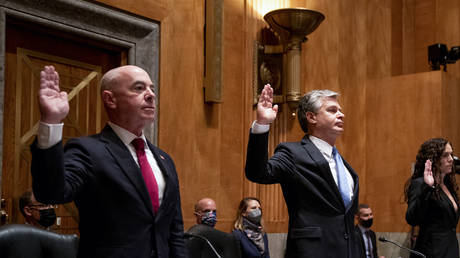
The Government Accountability Office has urged the FBI and Department of Homeland Security to do their jobs better
The number of domestic terrorism cases open in the US more than tripled between 2013 and 2021, growing by 357% during that eight-year period, according to a report released in late February by the Government Accountability Office (GAO). The watchdog agency implored the FBI and Department of Homeland Security to find ways to work together to prevent more attacks.
By 2021, the number of open cases classified by the FBI as “domestic terrorism” had soared to 9,049, up from just 1,981 in 2013, according to statistics the agency provided to the GAO. While the number of open cases actually declined by 23% during the first three years of that period, it skyrocketed more than 490% between 2016 and 2021. The number of alleged terrorist plots disrupted also nearly tripled during that period, growing from 81 in 2014 to 456 in 2021.
The DHS’s office of Intelligence and Analysis, meanwhile, counted just 231 domestic terrorism incidents between 2010 and 2021, with 35% of those considered “racially motivated,” and 32% stemming from “anti-government motivations,” the GAO report states. The incidents have been trending toward a higher body count as well, with zero deaths attributed to domestic terrorism in 2011 but 32 in 2019.
The report calls for closer collaboration between the two law enforcement agencies, lamenting that each uses different definitions and metrics to track crimes that fall under the same heading. It also asks both agencies to institute procedures to evaluate the effectiveness of their collaborative efforts.
Domestic terrorism in the US is “generally defined as involving criminal acts dangerous to human life occurring in the US that appear intended to coerce a civilian population or influence or affect the conduct of government,” the GAO states. However, the FBI tracks terror investigations and disruptions “consistent with its investigative mission,” while the DHS tracks “incidents which it defines attacks or plots, consistent with its definition.”
Part of the problem, officials have said, is that there is no separate criminal charge of “domestic terrorism.” Nor is there a list of American groups definitively known as “domestic terrorist organizations,” with one Justice Department official acknowledging that such a category would be constitutionally “problematic.” FBI whistleblowers have objected to what they describe as the miscategorization of nonviolent Americans as “domestic terrorists,” with regard to their peripheral involvement in the January 6, 2021 Capitol riot.




